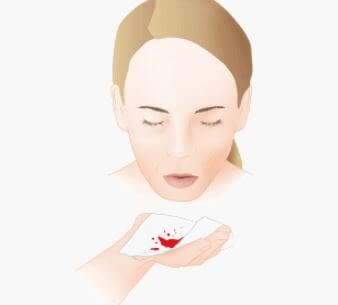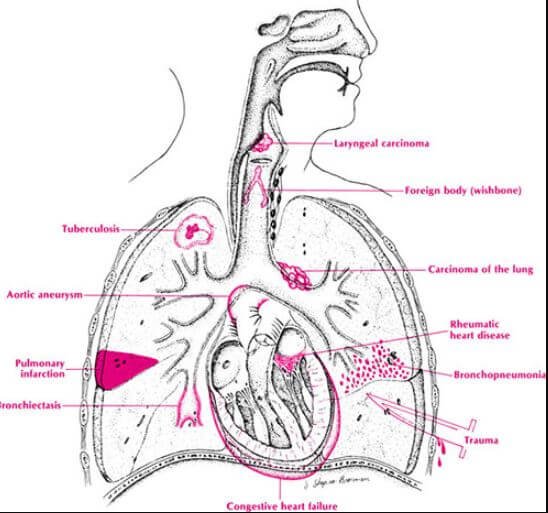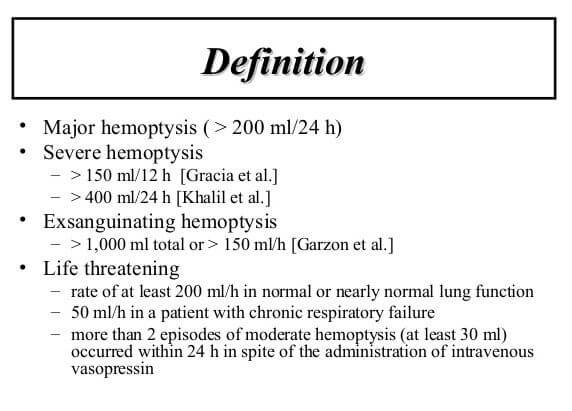Hemoptysis Definition
Hemoptysis is a condition that is characterized by coughing blood from your respiratory system. It is a life-threatening condition that needs urgent medical attention5.

Causes of Hemoptysis
Numerous factors can cause hemoptysis such as 3, 4:

Bronchitis
This is a disease that causes your lungs to swell or become inflamed. There are two types of bronchitis: chronic and acute bronchitis. Chronic bronchitis is a form of chronic obstructive pulmonary disease which irritates your airways. Chronic bronchitis results mostly from smoking and second smoke. Other causes of chronic bronchitis include environmental factors such as exposure to dust, chemicals and other pollutants.
Acute bronchitis is caused by a virus such as flu or common cold. The virus attacks your airways and causes swellings and inflammation. This virus can be spread from one person to another through sneezing.
Regardless of the type of bronchitis, persistent coughing can cause blood in the cough leading to hemoptysis.
Lung cancer
Lung cancers can be many. One of them is bronchogenic carcinoma which is common and accounts for about 44% of hemoptysis cases. Tumors in your lungs can cause bleeding which comes out when you cough.
Autoimmune disorders
Autoimmune disorders are conditions where your immune system wrongly attacks tissues and organs of respiratory system. This can cause bleeding in your lungs and in other parts of the respiratory system which can be present when you cough. Examples of autoimmune disorders are microscopic polyangiitis and lupus.
Trauma
Any form of injury or trauma to the lungs or any other part of your respiratory tract can cause bleeding. For instance, if you are shot in the lungs, you will bleed and this will be present in your cough.
Bronchiectasis
This is a disease marked by damaged, thickened and enlarged bronchial tubes that leads to the lungs. This causes mucus and microorganisms to accumulate in your lungs which can lead to infections in your airways. As a result, the infections can block your airways.
There are two types of bronchiectasis. One of them is cystic fibrosis bronchiectasis which is a genetic disease that increases production of mucus in your body. Another type of bronchiectasis is non- cystic fibrosis bronchiectasis. It is caused by other medical conditions such as autoimmune disorders, inflammatory bowel diseases, etc.
Bronchiectasis can last for many months and can make you cough daily. It can also make you cough blood and large amounts of mucus.
Pulmonary embolism
This is a condition where the artery in your lungs is suddenly obstructed. The obstruction occurs as a result of a blood clot in the deep veins of your legs. This blood clot can travel and reach your lungs where they can damage it. Besides blood clot, presence of tumors in your blood vessels can block an artery leading to the lungs which can cause this condition.
Tuberculosis
This is a disease that is caused by bacteria and is highly contagious. Tuberculosis is among the infectious diseases that cause many deaths globally. There are many types of tuberculosis but they are broadly classified as active and latent tuberculosis. Active tuberculosis is where you have an infection and the bacteria in your body are active. This type of tuberculosis is infectious. Latent tuberculosis is an infection where the bacteria present in your body are passive and this illness is not infectious. This type of infection can become active tuberculosis.
Tuberculosis affects your lungs mostly. But it can also affect your brain and kidney. Tuberculosis in your lungs causes pain in your chest as well as pain while breathing. It also makes you cough blood and have fever.
Pneumonia
This is a disease that affects your lungs. Pneumonia is caused by bacteria. This disease starts when you inhale contaminated air into your lungs which has bacteria that cause an infection. You can get pneumonia if you have flu or common cold. Apart from flu and cold, people suffering from asthma, diabetes, cancer, heart diseases are more likely to get pneumonia.
When you have pneumonia, you will cough up mucus that is green and contains blood. This can cause hemoptysis.
Diagnosis

Hemoptysis can be diagnosed through the following1:
Physical examination
Your doctor will talk to you and observe as you cough. This will provide clues to your doctor on what you are suffering from.
Your doctor can order the following test to diagnose hemoptysis:
Chest X-rays
Your doctor conducts X-ray tests to check for masses, congestion and fluid buildup in your chest and lungs.
Bronchoscopy
This test involves inserting a tube called bronchoscope in your mouth or nose into the airways. Your doctor uses bronchoscopy to find out the cause of hemoptysis.
Complete blood count
This is a blood test that measures the number of red blood cells, white blood cells and platelets. In this test, your doctor will take a sample of your blood and evaluates it in the laboratory. This test can help your doctor diagnose hemoptysis.
Urinalysis
This is a test done on your urine. In this test, your doctor may ask you to collect a sample of your urine and take it for analysis. Your doctor will give you instructions on how to collect urine to ensure that the test results are not interfered with.
Treatment
Treatment for hemoptysis focuses on stopping bleeding and curing its underlying causes properly. The following are treatment options for hemoptysis4:
Medications
Drugs may be prescribed to treat the underlying conditions. These medications include:
Bronchial artery embolization
Your doctor can put in a catheter via your leg into the artery delivering blood to the lungs. A dye is then injected to assist your doctor view your arteries clearly on a screen so as to check for the source of bleeding. Once the source is identified, it is blocked by a metal coil to stop bleeding.
Surgery
Severe cases of coughing blood can be treated through surgery intervention. Your doctor can perform a surgery procedure called pneumonectomy to remove the affected lung.
If you notice your cough is lasting longer and there is presence of blood and mucus in it, pain in the chest, higher fever, shortness of breath and loss of weight, seek for urgent medical attention.
Reference List
- Hemoptysis. Available at http://www.aafp.org/afp/2005/1001/p1253.html
- http://www.webmd.com/lung/coughing-up-blood
- http://www.merckmanuals.com/professional/pulmonary-disorders/symptoms-of-pulmonary-disorders/hemoptysis
- https://medlineplus.gov/ency/article/003073.htm
- http://www.healthcommunities.com/hemoptysis/hemoptysis-definition.shtml

Helped some but when I threw up the blood it was from a knot in my throat. First time it was red and the second time black.